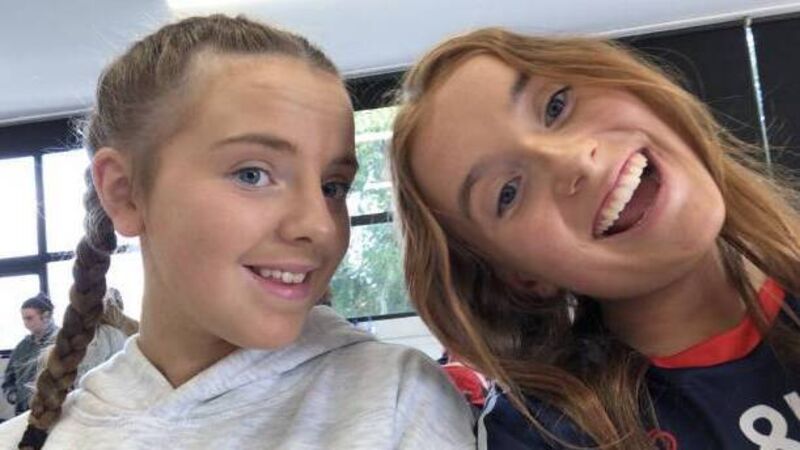Youth Matters: A fair wage for young people

Laura Roche and Aine Casey
THIS is the third article in our ‘Youth Matters’ series and I spoke to not just one, but two young people.
Aine Casey and Laura Roche are 16 year old students from the Mitchelstown surrounding area. They began working part-time during Transition Year and have shared their experiences of working with me.
Aine works in a cafe and Laura works in a creche; I noticed that there were many similarities in what they thought of their jobs but also, interesting differences.
“I worked as a childcare worker in a crèche,” said Laura, as she detailed her usual shift.
“My job entailed minding babies, cleaning up after them and answering the phone. I worked an hour after school three days a week.”
On the other hand, Aine told me about a very different day, working in a café: “My responsibilities in my job include greeting customers when they come into the premises, offering them menus and taking their order.
“After this is done, I then have to serve them their food and drinks and assist them in any further needs they may have.”
Both in childcare and hospitality, they noted that being a friendly face is really important - with both your colleagues and the public.
Aine said work needed to be carried out in a “polite and respectful manner”.
As well as working part-time, these young women have lots of interests. Laura is devoted to following Formula 1 races, she also plays soccer and playing with her beloved pet dog, a Cavachon.
Aine enjoys reading alongside her pet Labrador and avidly watched the latest season of Love Island.
Both girls have completed Transition Year and highlights from their TY calendar included a TY Ball organised by the students, being part of the cast of the school musical Footloose and camping overnight as their last TY trip away.
Laura and Aine enjoy spending time with their friends in their free time and have just started 5th year with Presentation Secondary Mitchelstown.
YOUNG PEOPLE AND WORK
Hearing the experiences of Aine and Laura prompted me to explore the issue of pay rates in general, particularly the minimum wage as this usually applies to young people.
According to Citizens Information: “Your employer can pay you more than the minimum wage if they want, but they are not required to by law.”
On top of that, the rate for a young person is lower. This is called a sub-minimum rate and it is vital young people are aware of this so that they can represent themselves, receiving the fair pay they are entitled to.
I asked Laura to tell me what the minimum wage in Ireland is. How did she do?
“Without googling,” she remarks, “the minimum wage for under 18s is €7.35 and €10.50 for over 18’s.”
Not quite. She is right about her own minimum wage category but the minimum for 18 year olds is €8.40, aged 19 is €9.45, and it’s only when you are over 20 that it’s €10.50.
In regards to the minimum wage, the National Youth Council of Ireland (NYCI) has called on the government to introduce a living wage. NYCI welcomes the increases of the minimum wage in recent years but feels these rates are a major issue for young workers as almost 4 in 10 of those on a minimum wage are under 25.
The argument for a living wage for young people is often that the minimum wage is too low to sufficiently live off, especially when faced with a background cost of living crisis.
However, the points sometimes brought up against it are that young people don’t, in reality, have to live off it: they don’t have a) mortgages, rent, heating bills, groceries, a car or as many expenses because they are paid for by their guardians and b) university degrees or further qualifications to justify higher pay.
I am grateful that, in Ireland, it is often the case that adolescents are living in financially secure households, but undeniably, we discount the youth who are supporting family members at home, who are living in poverty or insecurity while most of the average working day is, and should be, dedicated to receiving an education.
There is so much more to this conversation about whether the minimum wage for young people is fair, so I want to explore how a young person from Cork felt in regards to the topic. Fortunately, Laura feels she was paid well: “I do believe I was paid enough,” she said. “Because for the three hours a week I was there, I was doing the same as others who were working there with degrees.”
Thankfully, instead of running houses, many young people in Ireland can use a large portion of their income to save. I wonder if this was the case for Aine.
“I am saving up for a future car and travelling around the world when I’m older,” she explained.
Meanwhile, Laura said: “I spent my wage on food, clothes and also saved it.”
She explained what she’s putting her earnings away for. “I plan on spending my money while I’m on my summer holidays and putting money towards going to a Formula One race in the future.”
Laura and Aine believe working has many benefits. Along with giving them the freedom to make their own choices and plan their own futures. Laura said: “My favourite thing about working in childcare is that I don’t have to talk to as many people from the public as I’m quite a shy person when I’m with new people.
“I also loved minding the babies, it was my first experience with babies and I’d only had experience with toddlers and up. The girls I was working with were also so lovely and taught me so much.”
It was enlightening to hear how much she gained from her job, beyond her pay checque.
“Overall, I really enjoyed looking after kids.”
On the other hand, Aine’s favourite part of the day is actually when the customers leave: “I would say that the best part of my job is seeing customers walk out with a smile on their face.”
I end every interview in the Youth Matters series with the same question: “Do you think your voice as a young person is heard in Cork?”
Laura had an intriguing answer with regards to the respect her voice received in the workplace.
“During my time there, nothing happened that meant my voice needed to be heard and didn’t think I was underpaid,” she replied.
“However I do feel that some under 18s do deserve more than €7.35 an hour as they are doing the same work, if not more, as over 18s and employers take advantage of that.”
As someone who earns money from babysitting, part-time jobs and writing, I was fascinated to hear what Aine and Laura had to say about their jobs and how they differ from mine.
I think their personal stories fit into a wider conversation around working young people in Cork and nationally.
Next week: Amy interviews Rayaa Onog, aged 15, of Nigerian heritage, based in Cork.







 App?
App?


